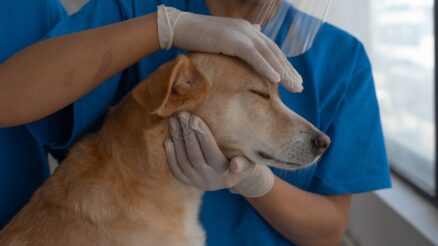Vaccinations are needed to protect the dog from viruses and infections that can be harmful or deadly. You have no way of preventing the dog from dying or suffering an unhappy and horrible life once it gets the deadly disease. Dogs are vaccinated against parvovirus, distemper, and rabies, among other diseases.
After the first shots, a booster for distemper and rabies is required every year and every other year. Vaccinations can protect your dog from many diseases if given regularly. Vaccination is an essential part of your dog’s overall health care plan.
Different Kinds of Dog Vaccinations
Knowing what vaccine your dog needs and how frequently you must vaccinate your dog are two important factors. The different vaccinations that your pet should receive are shown here.
1. Rabies Vaccinations
If the dog is exposed to a virus, this vaccine boosts the immune system to fight the virus. When the deadly rabies virus is given as vaccination, the body recognizes it as a foreign body and produces antibodies to overcome it. If a virus-infected animal bites the dog, the body now has enough antibodies to fight the virus, making sure that your faithful pet will not suffer from the disease. Learn more info here.
2. Bordetella Vaccinations
Kennel cough, commonly called bordetella, is a yearly infection often treated with a distemper vaccine. This keeps your dog safe from transmitting the virus to other pets. You can find it in dog daycare centers or training sessions. If your dog got the disease, it could be treated. The vaccine protects the dog from getting it, allowing it to enjoy a long and healthy life.
3. Parvovirus Vaccinations
This sickness affects puppies under the age of six months. The intestines, lymph nodes, immune system, and bone marrow are damaged. Vomiting, convulsions, weight reduction, and dehydration with coughing are all possible symptoms. Death comes instantly for some puppies. Puppies need proper medical care and vaccines to avoid such sudden death.
4. Distemper Vaccinations
Distemper is a virus that attacks the immune system and can cause serious complications or even death. This disease is caused by getting into contact with an infected dog’s feces. Other dogs may be infected because of airborne particles. Dogs hardly make it through. However, they suffer from muscle spasms and convulsions when they do.
If you see signs such as a fever over 104 degrees, depression, pus in the eyes, seizures, diarrhea, or throwing up, you should contact a veterinary emergency immediately. This viral disease may take your dog’s life or livelihood, so proper vaccination is necessary to prevent it.
Why Do Dogs Need Vaccinations?
Some people wonder why dogs need to be vaccinated; you should have your dogs vaccinated if you travel or live in a city or town. Kennels will not let dogs be boarded unless they have evidence of vaccinations. If you want to enroll your pet in obedience classes, you need to provide evidence of vaccinations.
Proof of rabies vaccination is required in all states before getting a dog license. If you own a dog, you must ensure its future health by having it vaccinated and, of course, licensed. This isn’t an option; it’s necessary to keep you, other dogs, and your dog safe. Check this to find out more about this clinic.
Conclusion
Dog owners should maintain their dogs’ vaccination following local regulations and veterinarian advice. Because the annual vaccines do not appear to hurt dogs in any way, there is no need to be worried and no harm in continuing the same schedule until the veterinary profession decides that a substantial change in dog vaccinations is needed. A little preventive care can go a long way in keeping your dog healthy.


